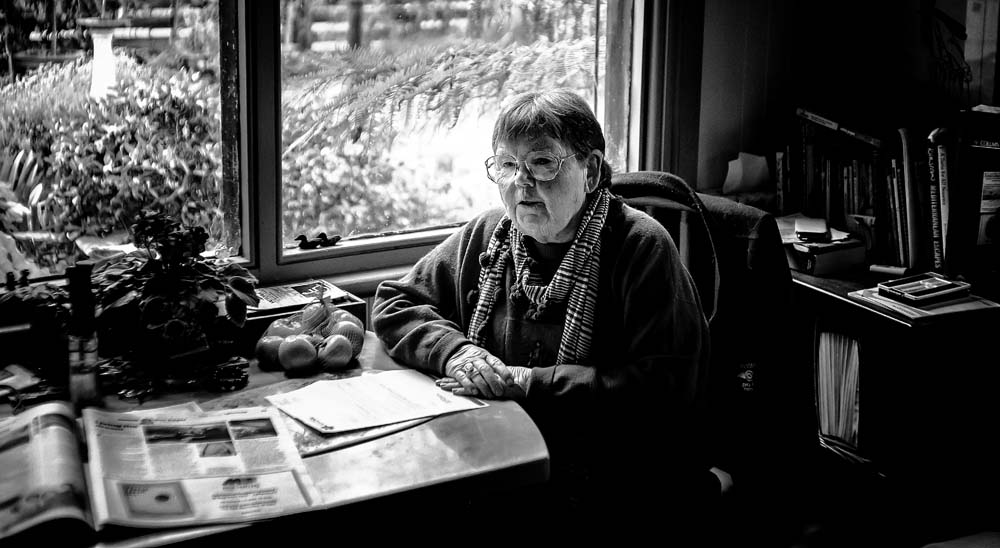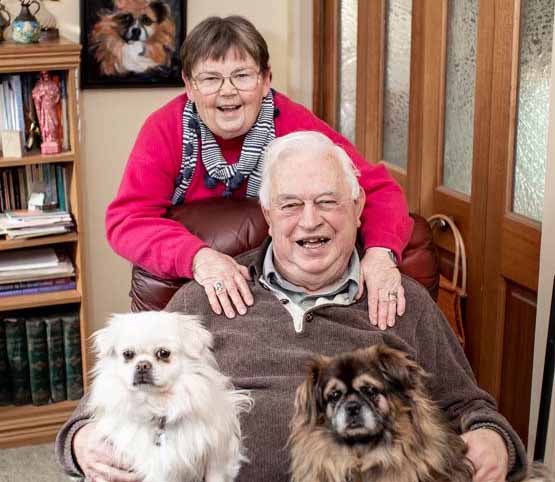
By Melissa Walsh Photos Yanni
There’s an unmistakable serenity when you walk into the home of Fran and Ian Henke, as if the walls have acquired the peace and tranquillity of the couple themselves. The weeping willow tree at the front window, the roses climbing freely across the picket fence gate and the aroma of daphne doesn’t hurt but it’s more than that. It’s a state of mind and a way of living that Fran talks about after discovering meditation many years ago.
For this journalist, author, artist and photographer, who turned 75 this year, life has been a series of challenges since contracting polio at an early age and the couple have had their fair share of turmoil but illustrate that quality of life is all about attitude. With her tenacity and inquisitive mind, this gregarious gemini has always found a way to realise her dreams, from discovering a love of words on her kitchen table at home penning her father’s real estate ads to working on The Canberra Times amongst politicians galore, to jumping on a cargo ship to London to experience a different world, writing shelves of books and novels, becoming a well-respected artist, and undertaking tertiary education at the age of 65. She is a published poet, has been media adviser for state and federal politicians, member of the Commonwealth Film Censorship Board, worked for 3AW, The Border Morning Mail, National Times, and The Australian. She is heavily involved in community work and recently released a book to spread the word on post-polio syndrome. She sculpts, paints, draws, gardens, writes and is determined to leave the world a better place.

“I discovered a passion for writing when I was a child growing up in the country. Mum was a fine pianist, she also loved words and encouraged me. My dad was a stock and station agent, and we lived in 11 houses in 17 years as he bought and sold. I learned to write at the kitchen table on clearing sale ads,” said Fran. “I think my rebellious nature comes from being told what I couldn’t do after contracting polio. I just decided to have a go at everything.”
Growing up with parents who loved to garden, it was a natural progression for Fran to want to create a sanctuary for herself wherever she was.
“Mum and dad were great gardeners and mum could make any place beautiful,” said Fran, who has since written books on gardening, as well as local and polio history, and two novels. “There’s so much I don’t know so I would research; if the answer wasn’t available, I would write a book about it. That’s how the first book happened. We had a tiny garden about the size of a dining table and I didn’t know how to manage it. There were no books on small Australian gardens so I wrote The Tiny Utopia in 1977. It sold well and I was asked to write The Perfumed Garden published four years later.”
A true lover of the garden, Fran sculpted a limestone piece called Saint Fiacre, the patron saint of gardening. He sits under the willow where generations of her precious dogs are buried. The garden was always a source of peace for her until discovering meditation.
“The spiritual journey led me to write The Faithful Garden, researching the great scriptures for plant and garden references. I saw in all of them the same threads about paradise – like universal truths,” said the unstoppable artist and writer.
Photos: Fran Henke
When she wanted to be an art critic, she wrote to Australian art historian Professor Bernard Smith for advice.
“He wrote back. I still have the letter. He said to be well researched and not say anything hurtful. I met him 40 years later at McClelland Gallery, quite amused that I’d done my best to follow his advice,” said Fran, who next realised she wanted to paint. “I was at an exhibition at the Mornington Gallery, saw Max Meldrum’s tonal work, and wanted to try. Over coffee talking about it, a painter friend ran across the road and bought me a box of pastels, and that’s how it started. She was learning portrait so I went too. Then I found I loved painting dogs.”
For Fran, school life was interrupted by polio and her sister’s death through cerebral palsy, so tertiary education was never an option.
“I always felt something was missing; then I found I could do visual arts at Chisholm Frankston.”
The year was 2008, at 65, and ignoring most of the late effects of polio, Fran majored in sculpture and printmaking.
“Having failed almost everything at school, I was delighted to pass with flying colours and seven high distinctions,” said Fran, whose home is laden with her beloved paintings of her dogs, sculptures, shelves of books and sweet smelling flowers from the garden. Her most recent book ‘Life Skills for Polios, a light-hearted handbook’ sits on the coffee table, designed to bring together the most recent information and advice from medical experts and those living with post-polio syndrome.
On the day she turned 75, Fran and Ian were hit hard with the flu.
“I felt depressed, then I realised that life is a series of plateaux. I had been excited at first about the 75 but the combination of age and the polio limits the amount of hilarity I can manage. Later, out with the dogs in the sunlight, I realised this was another level to accept and a poem emerged.”
We reach many plateaux in life
This one seemed less cumbrous but
The frigid day had me immobilised
Depressed this was the ledge ever after
Shafts of sunlight filled with dancing insects
Revived spirits as dogs and I explored
An overgrown rail reserve
Moving from one beam to another
With spiralling specks
At home, lunching on unsmashed avocado
Unfashionable Uneeda biscuits
(smeared with vegemite)
I made camp on the plateau.
“We are like a leaf in a stream,” said Fran. “You can hit some boulders, get caught in the side and then flow back on track. I think that’s why, at 75, and with Ian 82, we have managed all those boulders, and we are so content and happy. I have learnt that it’s not about money. There are seekers of power, seekers of money and seekers of truth. That is why our home is called VIDYA which is Sanskrit for ‘knowledge and truth’.”





